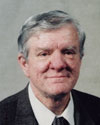Michael W. O'Neill, University of Houston Hugh Roy & Lillie Cranz Cullen Distinguished Professor of Civil Engineering, died of an apparent heart attack Saturday at his home. He was 63 years old.
A native of San Antonio, Texas, O’Neill made exceptional contributions to the deep foundations industry, and his findings still shape government regulations and industry practice across several areas, including deep water drilling, drilling on expansive soils, and strengthening bridge foundations in flood-prone areas.
O'Neill held a B.S., M.S. and Ph.D. in civil engineering from the University of Texas at Austin. He had more than 40 years of experience in applied research and consulting in deep foundations, soil properties, engineering design and field testing of foundation systems. He won numerous honors and awards, including being named the 1998 Karl Terzaghi Lecturer for the American Society of Civil Engineers.
In addition, O'Neill published more than 200 papers and peer-reviewed reports on foundations and soil mechanics. He was the co-author of a reference book on foundations for vibrating machines and the current Federal Highway Administration manual on drilled shafts.
"Basically, what I've been trying to do during my career," said O'Neill in an interview given in late October 2002, "is understand the behavior of deep foundations in just about every aspect: dynamic, static, the effect of installing the foundation on the soil properties, monitoring scour, how foundations interact with each other through the soil, group effects, how to enhance capacity, and electro-osmosis."
The hallmark of O'Neill's many achievements in the study of deep foundations stems back to a realization he had in graduate school.
"It dawned on me that the fundamental problem you had with deep foundations was determining the effect of constructing the foundation on the soil or the rock that you put it in," he said. "It's hard enough to try to characterize the soil--its stress-strain property, its strength, its compressibility--and it's even harder to figure out how the construction of the foundation affects those properties and what effect that has on the behavior of the foundation."
That realization catapulted O'Neill to a series of breakthroughs that still shape government regulations and industry practice. His more recent interests were in rapid construction.
"The more quickly you can construct something or retrofit it, the better it is," O'Neill said. "It saves money, it's less lost time for traffic, and it's less bothersome to the surrounding community. The key to good rapid construction is reducing the coring, the amount of drilling in rock or soil. Solving this problem will help foundation construction in virtually every city in the country."
Visitation services will be held Tuesday, Aug. 5, and memorial and funeral services will be held on Wednesday, Aug. 6 (see left sidebar for exact times and locations).
Professor O'Neill touched the lives of many friends, students, and colleagues. If you would like to share a message or story of how he impacted your life please email this tribute to: oneill [at] curly.cive.uh.edu (oneill[at]curly[dot]cive[dot]uh[dot]edu)
Notes received by the evening of Aug. 5 will be compiled and shared with family and friends of Michael O'Neill at the funeral services. Additional notes after August 5 will also be forwarded to the family.
In lieu of flowers, a memorial fund is being established for Professor O’Neill. If you wish to contribute, please send checks to the Civil and Environmental Engineering Department at the address below. Checks can be made out to the UH/Michael O’Neill Memorial Fund.
